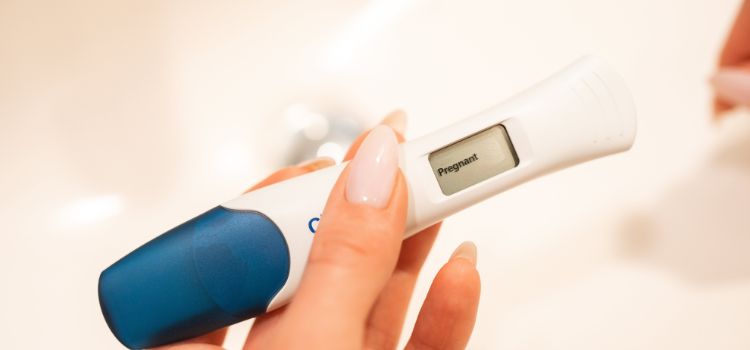A yeast infection does not directly affect the results of a pregnancy test. However, it is advisable to consult a healthcare provider for accurate diagnosis and appropriate treatment options.

A yeast infection is a common condition in women, caused by an overgrowth of candida fungus. On the other hand, a pregnancy test determines whether a woman is pregnant by detecting the presence of the hormone human chorionic gonadotropin (hCG) in her urine or blood.
The two occurrences are not directly related; therefore, a yeast infection does not impact the accuracy of a pregnancy test. While a yeast infection may not interfere with the test results, it is essential to consult a healthcare provider if you suspect you may be pregnant or if you experience symptoms such as itching, burning, or unusual discharge. They can provide appropriate guidance and treatment options for both conditions.
Understanding The Relationship Between Yeast Infections And Pregnancy Tests
A yeast infection may not directly affect the results of a pregnancy test. However, some symptoms such as itching and discharge can be mistaken as early signs of pregnancy. It’s always best to consult with a healthcare professional for accurate diagnosis and appropriate treatment.
Yeast infections are a common occurrence among women, and some may wonder if this condition can affect the accuracy of a pregnancy test. In this section, we will explore the effects of a yeast infection on pregnancy test accuracy, factors that may interfere with the test results, pH levels and their impact on test accuracy, the presence of vaginal discharge and its effect on the test, and different types of pregnancy tests and their susceptibility to interference.
Exploring The Effects Of A Yeast Infection On Pregnancy Test Accuracy
A yeast infection is typically caused by an overgrowth of the Candida fungus in the vagina. This infection does not have a direct impact on the accuracy of a pregnancy test. However, the symptoms associated with a yeast infection, such as itching, inflammation, and vaginal discharge, may lead to confusion or misinterpretation of a pregnancy test result.
It is important to follow the instructions provided with the pregnancy test and consult with a healthcare professional if you are unsure about the results.
Factors That May Interfere With The Test Results
Certain medications, such as antibiotics or antifungal creams, may influence the accuracy of a pregnancy test. It is advisable to consult with a healthcare professional if you are taking any medication that could potentially interfere with the test.
Taking a pregnancy test too early or too late in your menstrual cycle may also impact its accuracy. It is best to follow the recommended timeframe indicated on the test instructions or consult with a healthcare professional for guidance.
Storage conditions of the pregnancy test, such as exposure to extreme temperatures or improper storage, can affect the accuracy of the results. Make sure to read and follow the storage instructions provided with the test.
Ph Levels And Their Impact On Test Accuracy
PH levels in the vagina can vary, and this can potentially impact the accuracy of a pregnancy test. However, most pregnancy tests are designed to provide accurate results within a wide range of pH levels.
Nonetheless, if you suspect that your vaginal pH levels may be abnormal due to a yeast infection or other factors, it is recommended to consult with a healthcare professional for further guidance and evaluation.
Presence Of Vaginal Discharge And Its Effect On The Test
Vaginal discharge associated with a yeast infection can be similar in appearance to the early signs of pregnancy, such as implantation bleeding or increased cervical mucus. This similarity may cause confusion when interpreting the results of a pregnancy test.
It is advisable to consult with a healthcare professional if you are concerned about the presence of vaginal discharge and its potential impact on the accuracy of a pregnancy test.
Different Types Of Pregnancy Tests And Their Susceptibility To Interference
Home urine-based pregnancy tests are the most commonly used tests and are generally reliable. However, they may still be susceptible to interference from factors such as medications or improper test usage.
Blood tests conducted at healthcare facilities are considered the most accurate form of pregnancy testing and are not typically affected by yeast infections or other factors that may interfere with urine-based tests.
By understanding the relationship between yeast infections and pregnancy tests, you can make informed decisions when it comes to interpreting your test results. Remember to consult with a healthcare professional if you have any concerns or uncertainties.
Common Symptoms Of Yeast Infections And Pregnancy

Yeast infections during pregnancy can cause common symptoms such as itching, burning, and discharge. However, these symptoms won’t affect the accuracy of a pregnancy test.
Recognizing The Signs Of A Yeast Infection
- Itching and irritation in the vaginal area
- Burning sensation during urination or intercourse
- Thick, white, odorless vaginal discharge
- Redness and swelling of the vulva
- Soreness and rash in the affected area
Similar Symptoms Between Yeast Infections And Early Pregnancy
- Increased vaginal discharge: Both yeast infections and early pregnancy can cause an increase in vaginal discharge. However, in pregnancy, the discharge is usually thin, milky, and odorless, whereas in yeast infections, it tends to be thick and white without any odor.
- Fatigue: Feeling tired and exhausted is common in both early pregnancy and when experiencing a yeast infection.
- Breast tenderness: Hormonal changes during pregnancy can cause breast tenderness, similar to what can be experienced with a yeast infection.
- Increased urination: During early pregnancy, hormonal changes can lead to increased urination frequency, which may also be seen in women with yeast infections due to irritation.
How These Similar Symptoms Can Lead To Confusion In Determining The Cause
- Misinterpretation: Since yeast infections and early pregnancy share some symptoms, it’s easy to mistake one for the other, leading to confusion when trying to determine the cause.
- Delayed diagnosis: If someone assumes their symptoms are due to pregnancy and doesn’t consider the possibility of a yeast infection, they may delay seeking proper treatment, potentially worsening the infection.
- Anxiety and uncertainty: The overlapping symptoms of yeast infections and pregnancy can cause anxiety and uncertainty in individuals who are trying to conceive or are worried about pregnancy.
Remember, if you experience any symptoms that may be indicative of a yeast infection or pregnancy, it’s important to consult with a healthcare professional for an accurate diagnosis.
The Science Behind Yeast Infections And Pregnancy Tests
Yeast infections and pregnancy tests are not directly related, so a yeast infection should not affect the accuracy of a pregnancy test.
Yeast infections and pregnancy tests are two separate issues that may seem unrelated at first. However, there is an interesting correlation between the two. In this section, we will delve into the science behind yeast infections and pregnancy tests, exploring the role of the hCG hormone in pregnancy tests, understanding the role of Candida in yeast infections, and examining the interaction between hCG and Candida and its potential impact on test results.
So, let’s dive in!
The Role Of Hcg Hormone In Pregnancy Tests
- The presence of the human chorionic gonadotropin (hCG) hormone is essential for pregnancy tests to yield accurate results.
- HCG is produced by the cells that eventually form the placenta and is detectable in a woman’s urine or blood after embryo implantation.
- To confirm pregnancy, the hCG hormone level needs to reach a certain threshold, which varies depending on the sensitivity of the pregnancy test.
Understanding The Role Of Candida In Yeast Infections
Candida is a type of fungus commonly found in the vagina. Its overgrowth can lead to a yeast infection, also known as candidiasis. Yeast infections are typically characterized by itching, burning sensations, and abnormal vaginal discharge.
The primary culprit behind yeast infections is Candida albicans, a species of Candida that is naturally present in the vagina. Various factors such as hormonal imbalances, use of antibiotics, weakened immune system, and diabetes can contribute to the growth of Candida and subsequent yeast infection.
Interaction Between Hcg And Candida And Its Potential Impact On Test Results
Some studies suggest that elevated levels of the hCG hormone during pregnancy might increase the risk of developing a yeast infection. The hormonal changes in pregnancy can affect vaginal pH, creating an environment favorable for the growth of Candida.
While yeast infections do not directly affect the accuracy of pregnancy tests, they can cause disturbances in vaginal pH, potentially influencing the pH-sensitive components of some pregnancy test kits.
It is important to note that there is currently limited scientific evidence on the direct impact yeast infections may have on the reliability of pregnancy test results.
While yeast infections and pregnancy tests may appear unrelated at first, there is a growing body of evidence suggesting a potential interaction. Although yeast infections do not directly affect the accuracy of pregnancy tests, the hormonal changes during pregnancy can contribute to the development of these infections.
Factors To Consider When Taking A Pregnancy Test With A Yeast Infection

Factors to consider when taking a pregnancy test with a yeast infection include the type of test, timing, and accuracy. While a yeast infection may not directly affect the results, vaginal discharge can alter the test’s accuracy, so it’s important to take it into consideration.
The Importance Of Timing When Taking A Pregnancy Test With A Yeast Infection
Timing is crucial when taking a pregnancy test, especially if you have a yeast infection. Here’s why:
- Hormonal changes caused by pregnancy may trigger a yeast infection, making it important to consider the timing of your test to ensure accurate results.
- The presence of a yeast infection can affect the pH balance of your vagina, potentially interfering with the accuracy of the test. To get reliable results, it’s essential to understand when and how to proceed.
- Here are some factors to consider when timing your pregnancy test with a yeast infection.
Tips For Accurate Test Results
To ensure reliable results from your pregnancy test while dealing with a yeast infection, keep these tips in mind:
- Choose a sensitive home pregnancy test that can detect lower levels of the pregnancy hormone hCG in your urine. This can improve the accuracy of the results, even if a yeast infection might cause interference.
- Follow the instructions provided with the test carefully. Improper usage can impact the reliability of the results, particularly if you have a yeast infection.
- Opt for testing in the morning when your urine is more concentrated, which can increase the likelihood of accurate results.
- If you experience inconsistent results, consider consulting with a healthcare professional to confirm your pregnancy status.
Proper Hygiene And Cleansing Methods Before Testing
Maintaining proper hygiene and cleansing methods is vital before taking a pregnancy test with a yeast infection:
- Cleanse the external genital area gently with mild, unscented soap and warm water before testing. Avoid using harsh cleansers or douching, as these can disrupt the natural balance of your vagina.
- Use a clean, dry collection cup or container to collect your urine for the test. Make sure to wash your hands thoroughly before and after handling the container.
- Be cautious not to introduce any potential contaminants into the sample, as this could interfere with the accuracy of the test.
Recommended Wait Time After Treating A Yeast Infection Before Testing
It’s essential to wait a sufficient amount of time after treating a yeast infection before taking a pregnancy test:
- After completing a course of treatment for your yeast infection, wait at least a week before testing for pregnancy. This allows the pH balance of your vagina to return to normal, ensuring better accuracy of the test results.
- Waiting too soon after treatment can potentially yield false-negative results due to residual effects of the infection or treatment.
- If you have concerns about the wait time or accuracy of the results, consult with your healthcare provider for guidance on the best timing for testing.
Remember, when it comes to taking a pregnancy test with a yeast infection, timing and proper hygiene are crucial. By following these tips and waiting the recommended time after treatment, you can increase the accuracy of your test results.
When To Seek Medical Advice

A yeast infection will not affect the accuracy of a pregnancy test. However, if you are unsure about your test results or experiencing symptoms, it is always best to seek medical advice for a proper evaluation.
A yeast infection can certainly cause confusion when it comes to taking a pregnancy test. In some cases, the symptoms of a yeast infection may overlap with early signs of pregnancy, leading to inaccurate or inconclusive test results.
In this section, we will discuss the instances where seeking medical advice is crucial to address any concerns related to yeast infections and pregnancy tests.
Instances Where Medical Advice Should Be Sought
Inconclusive or conflicting test results:
- If you have taken a pregnancy test and the result is inconclusive or conflicting, it is recommended to consult with a healthcare professional. They can provide further guidance and order additional tests, if necessary.
Persistent symptoms of a yeast infection or pregnancy:
- If you experience persistent symptoms of a yeast infection, such as itching, burning, or abnormal discharge, it is important to seek medical advice. Similarly, if you are unsure whether your symptoms are related to a yeast infection or pregnancy, a healthcare professional can help determine the cause and provide appropriate treatment.
Exploring The Need For Professional Diagnosis And Care
When it comes to determining the cause of your symptoms and ensuring the accuracy of a pregnancy test, seeking professional diagnosis and care is crucial. Here are a few reasons why consulting with a healthcare professional is important:
Professional expertise:
- Healthcare professionals have the knowledge and experience to differentiate between a yeast infection and early signs of pregnancy. They can provide accurate diagnosis and recommend appropriate treatment options.
Guidance on home remedies:
- If you are experiencing mild symptoms, a healthcare professional can advise you on home remedies to alleviate discomfort associated with a yeast infection. They can also provide tips on maintaining good vaginal health during pregnancy.
Addressing potential complications:
- In some cases, a yeast infection during pregnancy can lead to complications if left untreated. By seeking medical advice, you can ensure that any potential complications are identified and addressed promptly.
Remember, while it’s common for yeast infections and pregnancy tests to cause confusion, seeking medical advice is the best way to address any concerns and ensure you receive appropriate care and guidance.
Preventing And Treating Yeast Infections During Pregnancy
Yeast infections during pregnancy can be prevented and treated effectively. However, it’s essential to note that a yeast infection will not affect the outcome of a pregnancy test.
Ways To Prevent Yeast Infections During Pregnancy
Maintain proper hygiene in the genital area by washing with mild soap and water daily. Avoid using scented products, such as soaps, bubble baths, and perfumed tampons, in the vaginal area as they can disrupt the natural balance of the vagina.
Wear loose-fitting, breathable clothing made from natural fibers like cotton to allow air circulation and prevent moisture buildup. Change out of wet bathing suits or sweaty clothes promptly to reduce the risk of yeast overgrowth.
Avoid douching, as it can disturb the pH balance in the vagina and increase the likelihood of yeast infection. Include yogurt with live cultures in your diet, as it contains beneficial bacteria (probiotics) that can help maintain a healthy vaginal environment.
Safe And Effective Treatments During Pregnancy
Consult with your healthcare provider before using any over-the-counter antifungal treatments for yeast infections during pregnancy. Your healthcare provider may recommend topical antifungal creams, such as miconazole or clotrimazole, which are considered safe to use during pregnancy.
Oral antifungal medications, like fluconazole, should be avoided during pregnancy unless specifically prescribed by your healthcare provider. Follow the recommended treatment course and finish the entire course of medication, even if symptoms improve. Seek medical advice if symptoms worsen or persist after treatment.
Tips For Maintaining Vaginal Health During Pregnancy
- Stay hydrated by drinking plenty of water to promote urination, which can help flush out bacteria and prevent infection.
- Avoid excessive sugar consumption, as it can contribute to yeast overgrowth.
- Practice safe sex by using condoms to reduce the risk of sexually transmitted infections that can lead to vaginal infections.
- Wipe from front to back after using the toilet to prevent bacteria from the anal area spreading to the vagina.
- Avoid tight underwear or pantyhose that can restrict airflow and create a moist environment that promotes yeast growth.
- Maintain a healthy diet rich in fruits, vegetables, and whole grains to support overall vaginal health.
Frequently Asked Questions Of Can A Yeast Infection Affect The Pregnancy Test
Can A Yeast Infection Cause A False Negative Test?
No, a yeast infection cannot cause a false negative test for the condition.
Does Infection Affect Pregnancy Test?
Infections do not typically affect the accuracy of a pregnancy test.
Is Yeast Infection Early Pregnancy Symptom?
Yes, yeast infection can be an early symptom of pregnancy.
What Can Affect A Pregnancy Test?
Factors that can impact a pregnancy test include the timing of the test, how it’s stored, and certain medications.
Final Words
While a yeast infection may not directly affect the results of a pregnancy test, it is important to be aware of the potential factors that could impact accuracy. Pregnancy tests work by detecting the hormone hCG, which is produced during pregnancy.
Yeast infections do not produce hCG, so they should not interfere with the test results. However, it is worth noting that certain medications used to treat yeast infections, like antifungal creams and suppositories, could affect the pH levels in the vagina.
This alteration in pH could potentially impact the accuracy of the test. Therefore, it is recommended to consult with a healthcare professional if you have concerns or are unsure about taking a pregnancy test while dealing with a yeast infection.
They can provide appropriate guidance and ensure the test is conducted accurately.
Leave a Reply